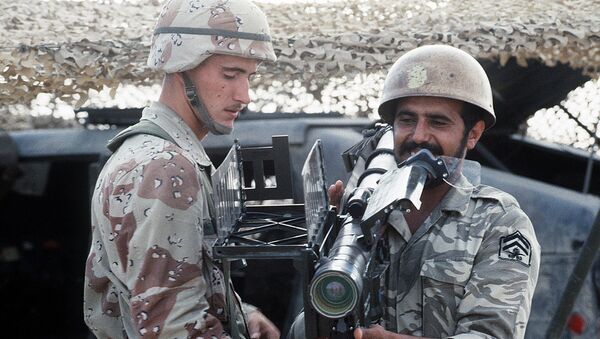The Washington Post has quoted unnamed White House sources as saying that the US is discussing “cost-sharing terms” with Saudi Arabia to expand a Pentagon mission in the kingdom aimed at protecting its oil infrastructure.
The sources referred to General Mark Milley, chairman of the Joint Chiefs of Staff, holding talks with senior Saudi officials on the Pentagon’s deployment of new radar, air defences and other military assets in the Gulf nation to help it tackle an alleged Iranian threat.
“When you internationalize… it makes it harder for the Iranians to lash out because they’re now not just lashing out at a [Gulf] country,” one source claimed.
It added that with Washington and Riyadh negotiating “burden-sharing” arrangements, Saudi Arabia is expected to financially support “some elements of the expanded US military presence, including upgrades to a major air base, fuel, water and logistics” in the kingdom.
The source was echoed by Milley who said that the US wants to maintain “significant military capability within the region to reassure allies and deter Iran from aggression”.
“As long as Iran knows we’ll use it, I think it’ll be effective,” he added.
Trump Confirms More US Forces to Arrive in Saudi Arabia
He spoke after President Donald Trump confirmed in a letter to Congress last week the Pentagon would send additional US troops well as radar and missile systems to Saudi Arabia “in the coming weeks”.
He added that the additional forces will include "an air expeditionary wing to support the operation of United States fighter aircraft from the Kingdom of Saudi Arabia, and two fighter squadrons", and that the total number of US troops in the kingdom would be approximately 3,000.
The US presence in the area aims to “assure our partners, deter further Iranian provocative behaviour, and bolster regional defensive capabilities,” Trump noted, adding that the American troops will remain in Saudi Arabia “as long as their presence is required” to implement these missions.
In September, the Pentagon authorised the additional deployment of US troops to Saudi Arabia, which Trump said at the time would be financed by Riyadh.
Iran Rejects Involvement in the Saudi Aramco Attacks
Earlier, US media reported that Washington’s plans to deploy additional troops to the kingdom emerged after September drone strikes on Saudi Aramco oil facilities that both countries have blamed on Iran and that partially disrupted Riyadh’s oil production, affecting global oil prices.
Iran strongly denied all the accusations which were also made by the UK, France and Germany, pointing out that the Yemeni Houthi movement claimed responsibility for the attacks.
Iranian President Hassan Rouhani blamed the three countries for engaging in a “groundless blame game,” while the country’s Foreign Ministry slammed their accusations as “irresponsible”.
Tensions between Iran and Saudi Arabia heightened in the wake of several attacks on oil tankers in the Gulf, blamed on the Islamic Republic which denied the allegations.
US-Iranian ties have worsened since President Trump unilaterally withdrew from the 2015 Iran nuclear deal, also known as the Joint Comprehensive Plan of Action (JCPOA), on 8 May, 2018, reinstating harsh economic sanctions against Tehran.
Exactly a year later, the Islamic Republic announced that it had suspended some of its JCPOA obligations while claiming that it doesn’t want to leave the nuclear deal.





